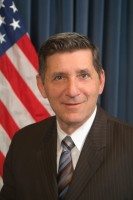
The leader of the anti-legalization group Project SAM, Kevin Sabet, sat down for an interview with the newly-confirmed head of the Office of National Drug Control Policy (a.k.a. “the drug czar”), Michael Botticelli. Yesterday, we looked at what the Drug Czar thinks of recent state legalization efforts (guess). Today, we continue with Botticelli’s thoughts on how legalization impacts people like him who are in recovery from drug addiction.
BOTTICELLI: It’s been a long time now, but I think back to my early days of recovery, and I remember how hard it was for me to do things like walk down the street and walk near the bars that I used to hang out. I used to cross the street. … As a person in recovery, I don’t want to be walking down the street and smell marijuana smoke. I don’t want to be walking down the street and see one more temptation because there is a marijuana dispensary down the street. … And I think assaulting people with seeing people smoke, and the smell and dispensaries and advertisement is yet one more thing that people, particularly people in early recovery, have to deal with and struggle with.
No kidding! I know that as a person in recovery from obesity, when I walk down the street and see McDonald’s or a Baskin-Robbins, or smell buttered popcorn at the movie theater, or watch TV and see commercial after commercial for junk food, it’s really hard to deal with those triggers. Obviously what we need to do is criminally prohibit all these things so people in early recovery from obesity have a chance to lead a thin, active, healthy life.
It’s galling to hear the Drug Czar talk about his own responsibility to steer clear of distribution and advertising of the drug he was addicted to, alcohol, while he maintains a position that it’s government’s responsibility to protect the tiny minority of people with other drug addiction issues from the smell of an herb 114 times safer than his drug of choice.
BOTTICELLI: I do wish the recovery community was much more involved in this, because I do think a lot of people probably feel the same way that I do. … I feel like their needs have not been heard and attended to as we think about what’s right to do for our communities. I agree that we’ve got to look at disproportionality in our criminal justice system, but how do we attend to the needs of everybody in our community, and I think the recovery voice often is not vocal. It’s clearly not heard as we’re thinking about, quite honestly, the commercialization.
The problem is that the “recovery voice” is often the drug rehabilitation centers. A large percentage of their clientele are marijuana consumers whose only problem with the drug is they got caught with it by police or a drug test and were forced to choose between rehab and jail. According to the Treatment Episode Data Set – Admissions for 2012, over 43 percent of those admitted to rehab who use marijuana were sent there by the criminal justice system, For those whose only drug was marijuana, over half were forced there by law enforcement (53.3 percent). And of those admitted only for marijuana, over one-third (36.3 percent) hadn’t used in the month prior to admittance and over half (55.4 percent) had used less than once per week.
BOTTICELLI: I fundamentally believe that we can continue to reframe how people with substance use disorders are perceived in the United States. I really do. We’ve come a long way. I know that lots of polls show that people would rather see people get treatment rather than incarceration, but I also know there are still significant stigma, and people still feel like this is a moral issue. I think that we can really continue to change the way we think about this illness.
This is where we see the blind spot in Botticelli’s viewpoint. There are people who don’t use drugs and there are people with an illness, period. There is no room in Botticelli’s world for the majority of drug consumers, especially marijuana, whose consumption is no more or less a problem than the average social drinker’s. Acknowledging those social drug consumers means treating them like social drinkers and not arresting them merely for their possession and use of their drug. To Botticelli, that means accepting that people like him will have to avoid more triggers to their drug relapse.
Botticelli’s view, like many, is that we already lost the war on alcohol, there’s no way we can end its commercialization and promotion because it is so ingrained in culture. My view is that maintaining marijuana prohibition in the world of legal alcohol and legal tobacco is like banning golf because football and boxing lead to concussions. Yes, it is theoretically possible to get smacked in the head by an errant golf ball, but wouldn’t anti-concussion efforts be better focused on football and boxing? (By the way, marijuana has shown to be protective against and therapeutic for those athletes suffering concussions in the football and boxing matches usually sponsored by Budweiser…)






